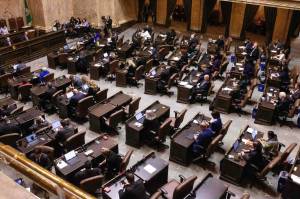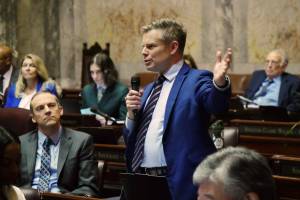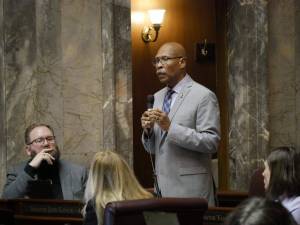Probe reveals family hiring at top level of state agency
Published 1:30 am Sunday, September 6, 2020
By Mike Reicher / The Seattle Times
She hired her nephew, a recent university graduate, for a $4,399-per-month job writing and reviewing proposals that was never posted publicly.
Then, she appointed her daughter to a $58,000-a-year analyst position under her supervision. Her son also worked in the agency.
While state law bans nepotism in public service, Judy Fitzgerald, one of the top officials at the state Department of Social and Health Services (DSHS), has wide authority to appoint employees.
But the Washington state auditor, following an anonymous whistleblower complaint, found that Fitzgerald crossed the line. While DSHS’s definition of a relative doesn’t include a nephew, Fitzgerald violated state law and department policy during the daughter’s hiring, the auditor found.
The investigation also found that other employees swapped Fitzgerald’s signature from her daughter’s appointment letter for another administrator’s, after their familial connection was discovered internally, and that Fitzgerald hiring her daughter and nephew contributed to overspending by DSHS’s budget office.
State laws are designed to guard against family influence in hiring, or any appearances of conflicts of interest. With taxpayer dollars at stake, government employment decisions are supposed to be driven by a candidate’s merit.
“It seems like this is a place where the assistant secretary is creating a tent that fits many of her family members inside of it,” said Ben Brunjes, an assistant professor of public policy in the Evans School at the University of Washington. “This doesn’t look great. In fact it looks pretty concerning from an outside perspective.”
Fitzgerald, who oversees DSHS’s Facilities, Finance and Analytics division and is paid nearly $155,000 a year, was admonished by DSHS Secretary Cheryl Strange, but not otherwise disciplined.
“Upon learning about this I immediately spoke with Ms. Fitzgerald about the policy violation and made it clear that this was against policy and highly problematic,” Strange said in an email.
As a result of the whistleblower investigation the department is developing nepotism policy training for hiring managers.
Fitzgerald told the investigator she didn’t think there was anything wrong with hiring her nephew, Seamus Gude, who recently graduated with a master’s degree and had an internship plus a few months of writing experience, according to his LinkedIn page.
Fitzgerald’s daughter, Anne Hesketh, underwent a competitive selection process with a review panel, but the nephew had no such independent evaluation. Hesketh is a “permanent” management analyst with benefits; Gude was hired in a temporary role to write and review legislative proposals.
In retrospect, Fitzgerald said she would have handled her daughter’s hiring differently and consulted with other department officials.
“I certainly regret the mistake in not informing our Human Resources Department of my daughter’s hire,” Fitzgerald said in an email to the Times. “I have benefited from further training on DSHS policies and have learned from this experience.”
What counts as a relative?
In the summer of 2018 DSHS was working to move foster care and other children’s services into a new agency, and needed help working with legislators. Fitzgerald said she reached out to Gude to help translate technical proposals into plain English. She didn’t consider anyone else for the job, which reported to the chief of the budget office, who reported to Fitzgerald.
“I didn’t think I was giving a special privilege,” Fitzgerald told the auditor’s investigator, adding it was typical to “grab people” for temporary positions.
Fitzgerald said Strange, the DSHS secretary, didn’t see any problem with the hire during a five-minute conversation before he was hired. Strange says she doesn’t recall the conversation.
State law prohibits employees from giving “special privileges” to a spouse, children, parents or “other persons,” but allows individual departments define who else is covered. DSHS’s policy prohibits relatives from being in a supervisory role, even twice removed, but it doesn’t cover an aunt-nephew relationship.
Fitzgerald’s son also worked at the agency at one point, but he wasn’t under her chain of command.
Fitzgerald told the auditor’s office, “It’s not rare at DSHS, that relatives end up in the same reporting structure.”
Strange agreed. “As the state’s largest agency employing over 16,000 individuals all across the state, in over 120 locations, that some offices may have relatives working in a same location… is not uncommon,” she said in an email.
Gude worked for three and a half months in 2018, and was rehired by the budget chief in 2019 for another three and a half months. Overall, Gude was paid roughly $36,000. He didn’t respond to an interview request.
In early 2019 a DSHS official informed Fitzgerald that the Central Budget Office was overspending because of Gude and Hesketh’s hirings, combined with department raises and another new position, according to an internal email provided to the auditor.
If DSHS secures legislative spending for its priorities, “I won’t feel bad about spending money on Seamus,” Fitzgerald replied.
‘Redo’ the appointment letter
Hesketh, Fitzgerald’s daughter, applied for a management analyst job in 2018 without disclosing her mother’s relationship. The auditor found that Hesketh emailed Fitzgerald her résumé, but didn’t find evidence that Fitzgerald replied or forwarded it to anyone else.
Fitzgerald’s assistant reviewed the applications and chose five candidates. Hesketh made the cut. A panel of employees narrowed the pool to three, inviting them to work on a project and present the findings to another panel. Again, Hesketh advanced.
One candidate dropped out, leaving Hesketh and an internal candidate. They were asked to analyze a mock project about hotel room service. After presenting their findings, all of the evaluators preferred the other candidate over Hesketh, one of the panelists told the auditor.
But both presenters made errors. Hesketh corrected her mistake, while the other candidate failed to identify his. She got the job. Fitzgerald signed her appointment letter and Hesketh worked in her chain of command, separated by one supervisor.
Four of the six employees on the finalist panel knew that Hesketh was Fitzgerald’s daughter, but they told the auditor the relationship didn’t influence their decisions. The auditor found “nothing that indicated the daughter was not qualified or a top candidate.”
While DSHS policy doesn’t prohibit the hiring of relatives, it does require a hiring manager to reveal the relationship, which is where Fitzgerald ran afoul of the policy, the auditor found. Also, she violated the state conflict-of-interest law because Hesketh was in her chain of command, according to the report.
Hesketh declined an interview request through a DSHS spokesperson.
In evaluating Fitzgerald’s consequences, Strange said she relied on the agency’s “progressive discipline” policy which begins with an admonishment, then ratchets up with further violations. Brunjes, the UW professor, said her discipline seemed reasonable.
About a month after Hesketh began work, the department’s human resources director says she learned about the relationship and informed the DSHS secretary’s chief of staff, Don Clintsman. He told the HR director to “redo” the appointment letter, swapping his signature for Fitzgerald’s, according to the report.
DSHS spokesperson Adolfo Capestany said in an email this “procedural process” is a “common practice within state government that is used as needed to reflect a change in an employee’s status.” Hesketh, however, was never notified of the change.
“The fact that the employees would want to cover their tracks is concerning because it suggests there was something untoward there,” Brunjes said.
About two weeks after that, Clintsman told Strange about the situation. She ordered that Hesketh be moved to a different division.




